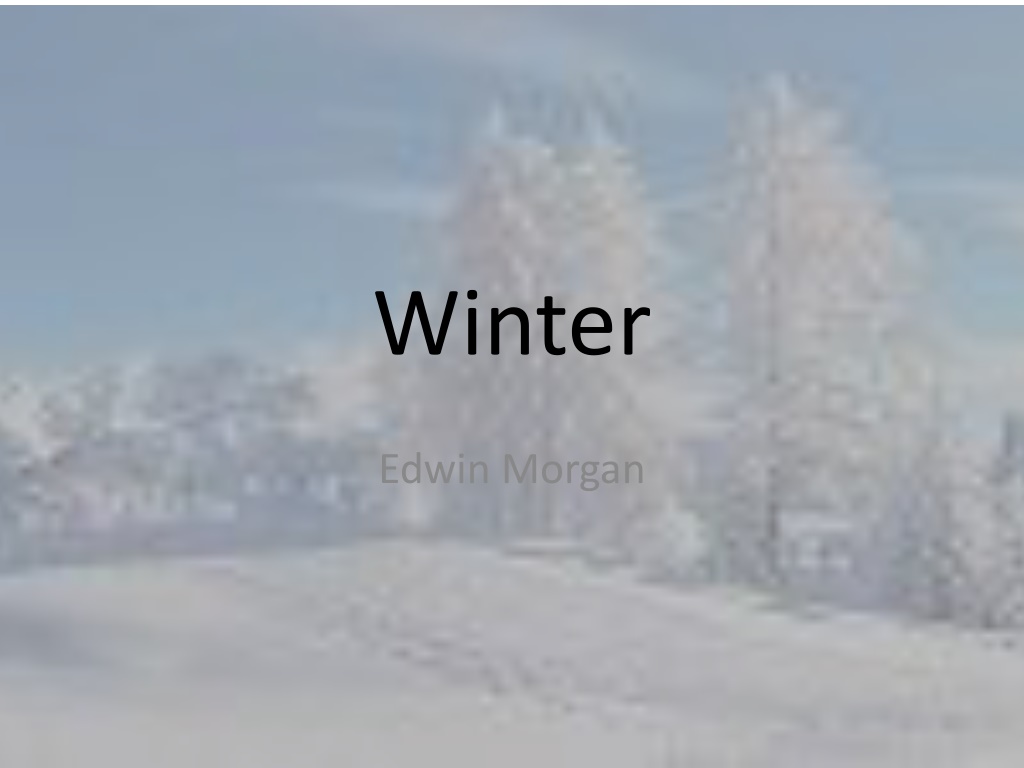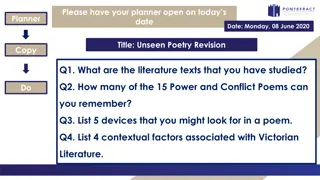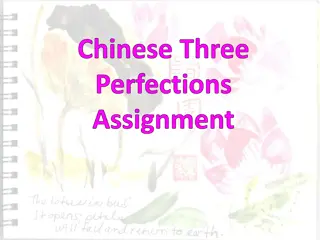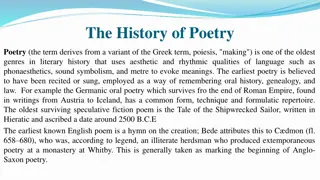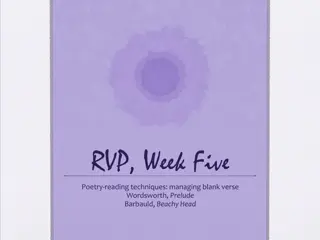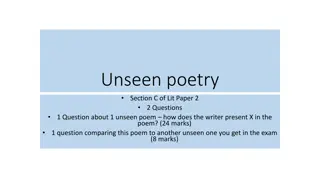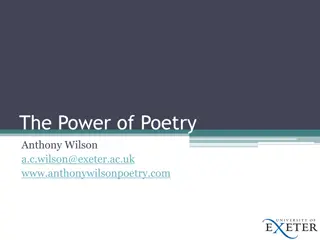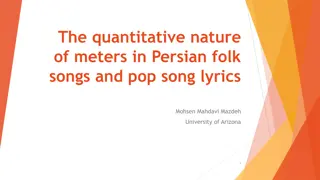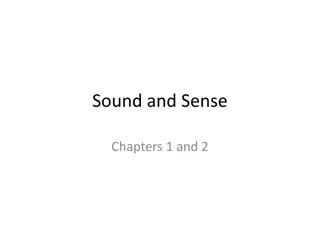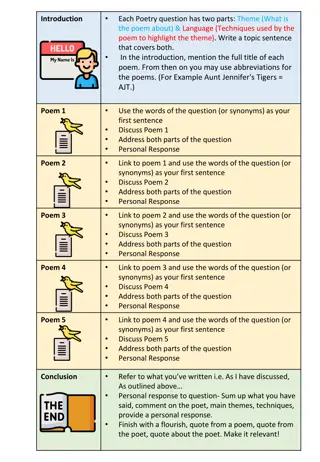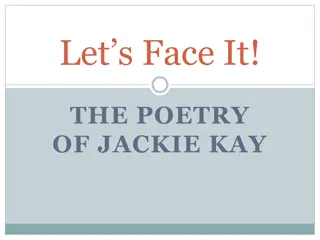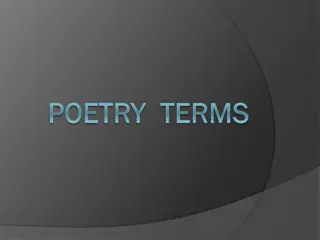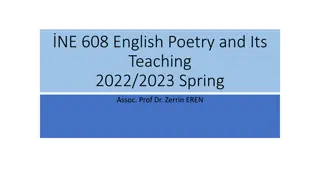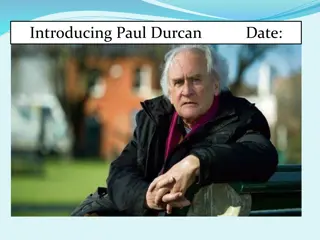Exploring the Themes of Winter through Poetry
Edwin Morgan's poem "Winter" and the intertextual references to Tithonus by Lord Tennyson are analyzed in this content. The contrast in moods between the poems, the relentless passing of time, and the symbolism of winter are explored. Techniques such as word choice, repetition, symbolism, and metaphor are discussed in depth, providing a deeper insight into the themes of mortality and decay portrayed in the poems.
Download Presentation

Please find below an Image/Link to download the presentation.
The content on the website is provided AS IS for your information and personal use only. It may not be sold, licensed, or shared on other websites without obtaining consent from the author.If you encounter any issues during the download, it is possible that the publisher has removed the file from their server.
You are allowed to download the files provided on this website for personal or commercial use, subject to the condition that they are used lawfully. All files are the property of their respective owners.
The content on the website is provided AS IS for your information and personal use only. It may not be sold, licensed, or shared on other websites without obtaining consent from the author.
E N D
Presentation Transcript
Winter Edwin Morgan
Round Robin What do you associate with winter?
Think of as many words as you an to describe these pictures:
Tithonus is cursed to live forever desipte the fact that everything around him grows old and dies. Tithonus asked Aurora (Goddess of the dawn) to grant him eternal life. Aurora granted his wish. The Hours, the Goddesses who accompany Aurora, were angry that Tithonus was able to resist death, so they took their revenge by battering him until he grew old and withered. Now, though he cannot die, he remains forever old; and he must dwell in the presence of Aurora, who renews herself each morning and is thus forever young. Tithonus appeals to Aurora to take back the gift of immortality
Winter Like Trio this poem deals with the topic of winter . However, it has a very different mood. In your pairs decide what the mood of this poem is. What lines/words/ideas helped you decide the mood of the poem?
Situation In Winter, Edwin Morgan writes about death and the relentless passing of time. Winter borrows words and ideas from Tennyson s poem Tithonus. In Tithonus, the title character, a Trojan, is granted immortality but does not ask for eternal youth. As a consequence, he is doomed to age and wither, but never die. Tithonus laments that Aurora, Goddess of the Dawn, keeps him in her home in the east (from which she rises every morning). In this poem, Morgan depicts a frozen pond, near his home in the West End of Glasgow, that becomes a symbol of death.
Techniques Word Choice Repetition Symbolism Metaphor
Repetition of goes and gone reinforces idea of the passing of time. Negative verbs. Note: present tense! Deterioration and death are two prominent ideas in the opening line of the poem. Decay and dies contribute to an idea of ageing and, eventually, passing away More negative verbs. The year goes, the woods decay, and after, many a summer dies. The swan on Bingham s pond, a ghost , comes and goes. It goes, and ice appears, it holds, bears gulls that stand around surprised, blinking in the heavy light, bears boys when skates take over swan-tracks gone. Metaphor - links with this idea of life ebbing away. Usually a swan is a beautiful creature, but here it is haunting = dark imagery. Oxymoron - a figure of speech when two words that contradict each other are used together. It s a good description of the quality of daylight you can see in winter, when the sky seems low and brooding feels unsettling.
There seems to be a contradiction in the way the ice is pictured here. In line 8 it is said to be swan-white but in line 9 it glints only crystal beyond white . The colour has gone. It is as if Morgan creates that first, positive colour, then pulls back from it again. After many summer dyes, the swan-white ice glints only crystal beyond white. Even dearest blue s not there, though poets would find it. I find one stark scene cut by evening cries, by warring air. First mention of the 1st person narrator Word choice negative connotations of violence and conflict He is a poet, however, and even he can t find it. It s as if the winter is so bleak that it has depressed him and drained the poetry out of him.
This is the point where humanity leaves the poem. First the voices fade in line 15 as the boys seem to skate further away . More repetition of negative verbs associated with death and the passing of time The muffled hiss of blades escapes into breath, hangs with it a moment, fades off. Fades off, goes, the scene, the voices fade, the line of trees, the woods that fall, decay and break, the dark comes down, the shouts run off into it and disappear. then disappear. This poem has had a swan, some gulls, and a group of skating boys, but they are all gone now. Only the woods are left but even they are decaying.
Light, which is always a metaphor for something positive, has gone. In its place we have another metaphor - monstrous fog. Even artificial, human attempts at creating light have been defeated At last the lamps go too, when fog drives monstrous down the dual carriageway out to the west, and even in my room and on this paper I do not know about the grey dead pane of ice that sees nothing and that nothing sees. The poem is now leaving the world of nature. The ending is very nihilistic. This means that it is bleak, that it is interested in nothingness (we see the word nothing repeated within the final line.) This is an odd thing for him to say. He does know about the ice, because he described it for us earlier in the poem. He just does not seem to feel that he has got to grips with it, or engaged with it.
FORM AND STRUCTURE In this poem, the speaker uses the past tense to reflect on time and mortality. Although there is only one stanza, a natural break occurs between lines ten and eleven. In the first ten lines, the speaker establishes the setting and melancholic mood of the poem. He considers the passing of the seasons on the pond and, through his word choice and imagery, reveals death as the central concern of the poem. In the latter section of the poem, he focuses on one particularly vivid memory to reflect on the paradox that although death is a certainty, it remains an enigma which even poets imaginations cannot decipher. The word choice and imagery are powerful and create a bleak sombre mood, while repetition and enjambment emphasise the inexorable and cyclical nature of the passing of time.
Themes Death Time Ageing Pessimism
THEMES The main themes of the poem are the passage of time and death. Through the description of the progress of a day, Morgan s speaker shows how vitality fades and, as a conclusion, disappears completely. Though the language he employs is engaging, the dark nature of this message sticks in the reader s mind. Tennyson s poem was a tale of suffering and lamentation and with such close links to his work, Morgan s poem possesses a similarly despairing, bleak and nihilistic quality. As time passes, a person becomes more aware of his or her distance from youthful promise and possibility. What we also understand is the speaker s recognition of the inevitability of death. The metaphor of the pond as life is particularly effective as we see that, with the passing seasons, all things change and are part of a natural process. If spring represents fertility and vitality, winter comes as the natural conclusion to the cycle. Though Morgan s language provides an eloquent examination of a dark idea, his skill also leaves a haunting image in the reader s mind.
Symbolism Colour: the poet uses colour throughout the poem to symbolise both life and death. Highlight any examples of this. The swan is a symbol of life it leaves when winter arrives but it also relates to death when it is described as a ghost.
Winter is also symbolic of death as is the cold ice, darkness and the fog the poet describes. However although the poem is about death, it is also about rejuvenation it s not permanent summer will come again. The poem is about the cycle of life and death.
Questions on lines 1-12 1. Look at lines 1-12. How does the poet give the idea of time passing: the seasons going by and years passing? 2. Why do you think the swan leaves when ice appears? 3. How does the poet show us the winter ice getting thicker and stronger?
Questions on lines 13-18 4. The idea of everything being cold and dead is contrasted with the liveliness of the skaters. How is word choice used to show the skaters bringing the pond to life? 5. Straight after the liveliness of the skaters we are told that the sound and energy fades off. How do lines 15-18 convey the idea of death and decay?
Questions on lines 19-24 6. What tells us we are now in the modern day? 7. The poet still sees winter as a symbol of death. What arrives and puts out all the light? 8. The writer uses an example of imagery to show how all consuming and lonely he thinks the cold and darkness of winter can be. What type of image is this?
